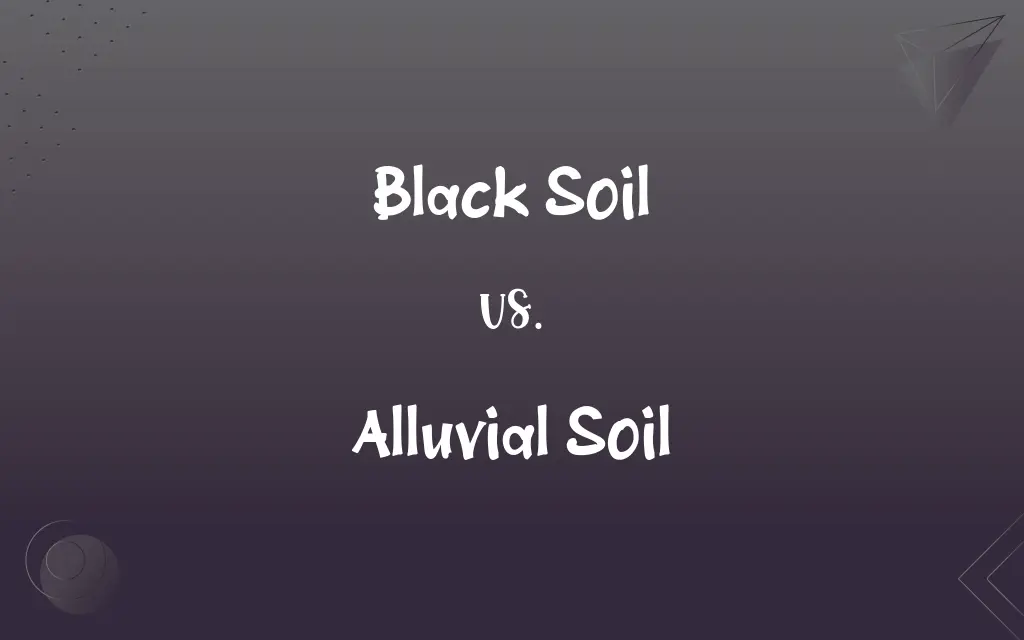Black Soil vs. Alluvial Soil: What's the Difference?
Edited by Aimie Carlson || By Janet White || Published on February 12, 2024
Black Soil, rich in iron and aluminum, is ideal for cotton cultivation; Alluvial Soil, enriched by river deposits, supports diverse crop growth.

Key Differences
Black Soil, known for its moisture-retaining capacity, is crucial in cultivating cotton and oilseeds. Contrarily, Alluvial Soil, deposited by rivers, is fertile and versatile, supporting a variety of crops including grains and vegetables.
Black Soil's high clay content makes it sticky when wet, posing challenges for plowing. In contrast, the sandy to silty nature of Alluvial Soil offers easier tillage and better drainage.
Black Soil, prevalent in volcanic regions, is rich in minerals like magnesium and calcium. Alluvial Soil, formed from river sediments, often contains organic matter and nutrients essential for robust plant growth.
Black Soil expands and contracts significantly, which can affect root development of plants. Meanwhile, Alluvial Soil's relatively stable structure provides a consistent environment for root growth.
Black Soil, mainly found in arid and semi-arid regions, is suited for dry farming. Conversely, Alluvial Soil, abundant in river valleys and deltas, is more conducive to irrigation-based agriculture.
ADVERTISEMENT
Comparison Chart
Texture
Clayey, sticky when wet
Sandy to silty, loose
Fertility
Rich in iron and aluminum
High in organic matter
Cultivation
Ideal for cotton, oilseeds
Suitable for grains, vegetables
Region
Volcanic areas, arid regions
River valleys, deltas
Drainage
Poor due to high clay content
Good, due to finer particles
ADVERTISEMENT
Black Soil and Alluvial Soil Definitions
Black Soil
Black Soil, known for its high clay content, retains moisture effectively.
The Black Soil in my garden retains water longer than other soils.
Alluvial Soil
Alluvial Soil, deposited by rivers, is highly fertile.
The Alluvial Soil in the Nile Delta supports abundant crop growth.
Black Soil
Black Soil, a type of vertisol, is dark and rich in nutrients.
Cotton thrives in the Black Soil of the Deccan Plateau.
Alluvial Soil
Alluvial Soil varies from sandy to clayey in texture.
Vegetables grow well in the sandy Alluvial Soil near the riverbank.
Black Soil
Black Soil is often found in areas with volcanic rock.
The Black Soil near the extinct volcano is excellent for grape cultivation.
Alluvial Soil
Alluvial Soil is usually well-drained and suitable for diverse crops.
The Alluvial Soil in this area is perfect for growing both wheat and corn.
Black Soil
Black Soil is characterized by its ability to swell and shrink.
Farming in Black Soil requires careful timing due to its shrinking and swelling.
Alluvial Soil
Alluvial Soil is often rich in minerals and organic matter.
The Alluvial Soil in our region is great for organic farming.
Black Soil
Black Soil is ideal for growing crops like cotton and soybeans.
The cotton fields thrive on the Black Soil of the central plains.
Alluvial Soil
Alluvial Soil is typically found in river valleys and deltas.
Rice cultivation is common in the Alluvial Soil of the Ganges plains.
FAQs
What makes Black Soil unique?
Its high clay content and ability to retain moisture make Black Soil unique.
What is Alluvial Soil?
Alluvial Soil, formed by river sediments, supports a wide range of crops.
Where is Black Soil typically found?
Black Soil is common in volcanic regions and arid areas.
Can Black Soil support irrigation?
Black Soil supports limited irrigation due to poor drainage.
What is Black Soil?
Black Soil is a nutrient-rich soil, ideal for cotton and oilseed cultivation.
Where is Alluvial Soil typically found?
Alluvial Soil is abundant in river valleys and deltas.
What crops grow well in Alluvial Soil?
Grains, vegetables, and a variety of other crops thrive in Alluvial Soil.
Is Black Soil acidic or alkaline?
Black Soil is typically neutral to slightly alkaline.
What is the pH level of Alluvial Soil?
The pH of Alluvial Soil varies but is generally slightly acidic to neutral.
How is Alluvial Soil formed?
Alluvial Soil forms from the deposition of river sediments over time.
What makes Alluvial Soil unique?
Its formation from river deposits and high fertility make Alluvial Soil unique.
Is Alluvial Soil good for irrigation?
Yes, Alluvial Soil is well-suited for irrigation-based agriculture.
Is Black Soil easy to plow?
Plowing Black Soil can be difficult when wet due to its clayey nature.
How does Black Soil affect water drainage?
Black Soil has poor drainage due to its high clay content.
What are the challenges of farming in Black Soil?
The main challenges include its stickiness when wet and expansion-contraction properties.
What type of irrigation is best for Alluvial Soil?
Drip or sprinkler irrigation works well with Alluvial Soil.
Is Alluvial Soil prone to erosion?
Alluvial Soil can be prone to erosion, especially in areas with strong river currents.
How is Black Soil formed?
Black Soil forms from the weathering of volcanic rocks and lava.
Can Alluvial Soil support heavy machinery?
Yes, Alluvial Soil can generally support heavy farming machinery.
Does Black Soil require a lot of fertilizer?
Black Soil is naturally fertile but may require fertilization for continuous cropping.
About Author
Written by
Janet WhiteJanet White has been an esteemed writer and blogger for Difference Wiki. Holding a Master's degree in Science and Medical Journalism from the prestigious Boston University, she has consistently demonstrated her expertise and passion for her field. When she's not immersed in her work, Janet relishes her time exercising, delving into a good book, and cherishing moments with friends and family.
Edited by
Aimie CarlsonAimie Carlson, holding a master's degree in English literature, is a fervent English language enthusiast. She lends her writing talents to Difference Wiki, a prominent website that specializes in comparisons, offering readers insightful analyses that both captivate and inform.








































































